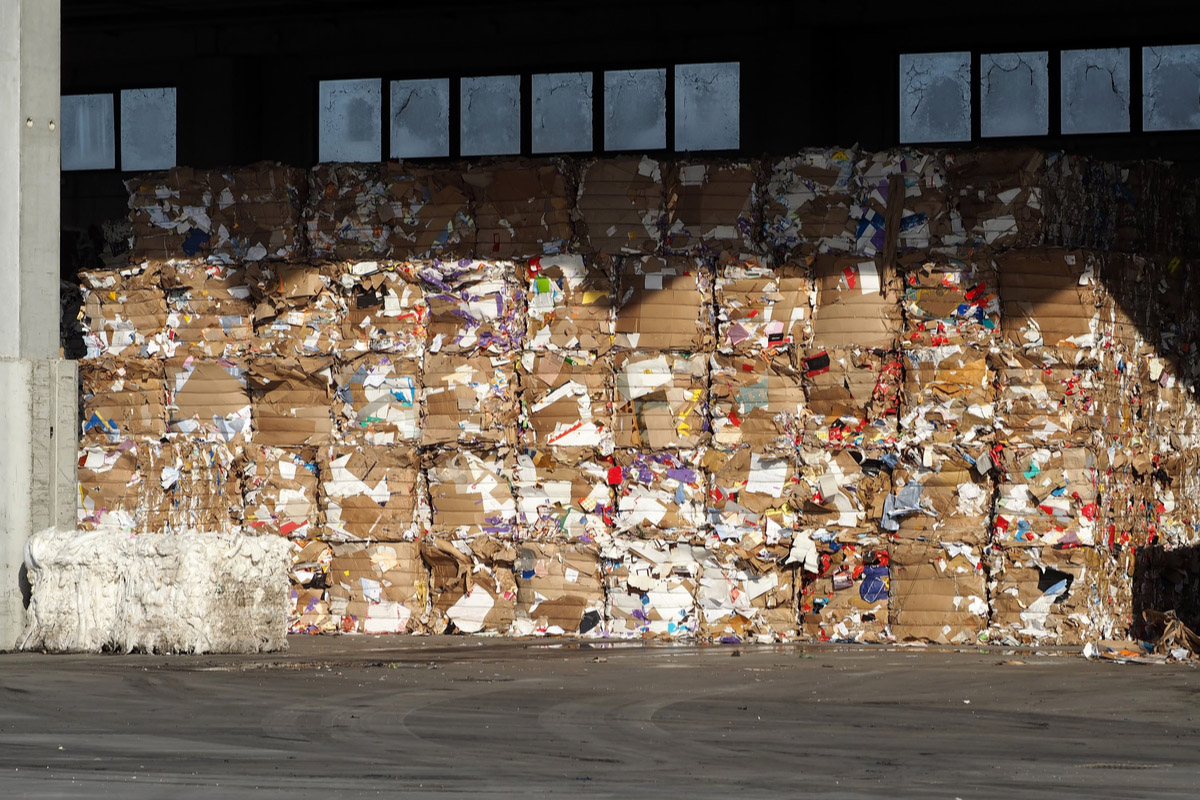
Recycled fiber prices mean a lot to WestRock, which takes in about 8 million pounds of the material each year. | Luca Pbl/Shutterstock
WestRock consumes millions of tons of OCC and other recovered fiber each year, so the paper products giant would love to know as much as anybody else what the future has in store for bale pricing.
But so many factors affect material values – global markets, the interplay between virgin and recycled fiber markets, emerging recycling capacity – that forecasting is a major challenge, said Alpa Sutaria, senior vice president of strategy and sustainability for WestRock.
“It’s really hard to predict anything around pricing, but I would say it’s definitely one of the areas that we continue to watch,” she told Resource Recycling in an interview.
WestRock, a Sandy Springs, Ga.-headquartered manufacturer of containerboard and paperboard, expects to use over 5 million tons of recycled fiber in its 2023 fiscal year (October 2022 through September 2023), most of that OCC.
The company has 18 recycling facilities that collectively take in nearly 8 million tons of recycled material, using about 75% of that internally and selling the rest. Five of those recycling facilities take mixed recyclables from curbside programs, and the rest are commercial recycling facilities that bring in paper from large businesses.
“[The recycling division is] not about us making money per se. It’s really about making sure that we have a great supply of recycled fiber, which we rely on,” said Sutaria, who joined WestRock from The Coca-Cola Co. about a year ago.
Riding market waves
Like other recycling companies, WestRock has had to navigate wild markets for OCC in recent years. According to RecyclingMarkets.net, OCC averaged about $25 a ton at the beginning of 2020, only to have pandemic-driven supply and demand trends drive the price to as high as $171 a ton in September 2021. Then began a slow slide, which turned into a collapse last fall. The average now sits at around $32 per ton.
Company executives announced in February they are no longer predicting their financial results for the full year, citing uncertain economic conditions. But they are forecasting a strengthening of OCC prices through the second, third and fourth quarters of 2023.
Sutaria acknowledged that when recovered fiber prices are high, it impacts the company, and when they’re low, WestRock enjoys a benefit. But even with volatile markets, recycling remains an “integral part of our overall sustainability agenda,” Sutaria said.
During the 2021 fiscal year, 37% of WestRock’s fiber feedstock was recycled material, including both post-consumer and production scrap material.
OCC isn’t something WestRock can walk away from when prices skyrocket.
WestRock’s customers continue to have clear expectations in terms of the recycled-fiber products they’re receiving, she noted. Individual consumers and WestRock’s customers care a lot about that recycled content.
While the company certainly makes feedstock purchasing decisions, WestRock’s paper plants must work within an operational set of parameters.
“There are only so many degrees of freedom there in terms of how high or lower you’re going to go,” Sutaria noted.
Sutaria did note that there’s been a global shift in macroeconomic trends in the past few years. Before COVID-19, WestRock enjoyed relatively steady growth in demand for its products. Then, with the pandemic, increasing consumer spending drove a tremendous runup in demand.
Now, as the economy is shifting, there is a pullback in spending in some of those areas, Sutaria said. What WestRock’s customers experience in terms of demand, WestRock experiences at the same time or earlier, she said.
Investing for the future
In the interview, Sutaria also touched on technology and government policies.
She said WestRock invested over $7 million through 2022 to improve sorting at its recycling facilities. The recycling facility in Marietta, Ga., for example, now has optical sorters and robots, she said.
It’s better for WestRock to invest in producing cleaner bales than it is to try to intercept contaminants downstream in the pulping process, she said.
She also touched on extended producer responsibility (EPR) policies. WestRock is a member of the American Forest & Paper Association (AF&PA), which has been fighting state EPR bills that don’t provide exemptions that could apply to paper product makers.
“We believe that great policy can be a way to drive better recycling, and when that policy is focused on things that are difficult to recycle, not recycled at scale and really problematic, that’s awesome,” Sutaria said. The company is not a fan of poorly crafted policy that gets in the way of recycling that’s working well today, she said.
WestRock sees California’s EPR law as a well-crafted set of guidelines and regulations that provide a balanced approach for all materials and offer an off-ramp when recycling is happening at scale, she said.